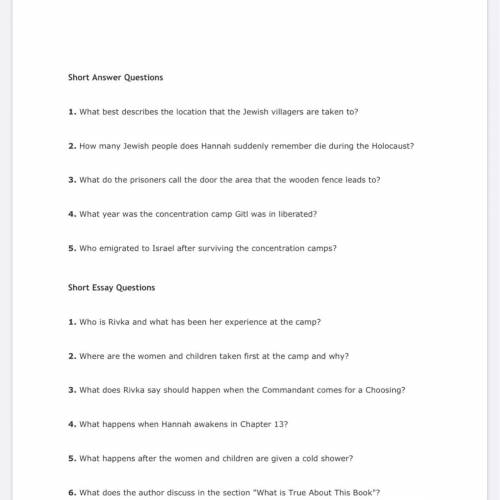The question are from “ The Devil’s Arithmetic”
...

Answers: 3
Another question on English

English, 21.06.2019 17:30
Which information would the reader know if the mother were the narrator? select each correct answer. what the father thought about his wife's involvement in politics
Answers: 1

English, 21.06.2019 18:30
Which sentence best describes the biased way the author approaches this topic? boars = bacon. and gammon, chops, sausages and feel your salivary glands begin to tingle at the thought of your teeth sinking into that first tender mouthful, and you will be half way towards a sensible attitude towards these creatures. they’re pigs. porkers, hogs, swine, if you will. they dig up people’s gardens, occasionally attack their dogs, spread disease and generally cause a nuisance. in culinary terms, they’re no different to cows or sheep or any of the other feeble-minded, four-legged frolickers which, in various pasties, pies and other assorted pastry cases, end up on our steaming plates on a daily basis. low in fat but high in deliciousness, by eating a wild boar you aren’t depriving poor little peppa and george of a long-lost cousin, but rather reaffirming your god-given position at the top of the food chain. if a boar could eat you it would, thus i say we should return the favour with interest. so say no to the misty-eyed squealers and man up, tuck in and pig out!
Answers: 1

English, 22.06.2019 16:00
Which identifies a feature common to both excerpts? a) setting- location b) conciliatory tone c) setting- time period d) servants or servile characters
Answers: 3

English, 22.06.2019 17:30
Read the excerpt from act 1, scene 3, of the tragedy of julius caesar and the background information on the allusion it contains. cassius. and why should caesar be a tyrant then? poor man, i know he would not be a wolf but that he sees the romans are but sheep. he were no lion, were not romans hinds. those that with haste will make a mighty fire begin it with weak straws. what trash is rome? what rubbish, and what offal? when it serves for the base matter to illuminate so vile a thing as caesar! but, o grief, where hast thou led me? i perhaps speak this before a willing bondman: then i know my answer must be made. but i am armed and dangers are to me indifferent. casca. you speak to casca, and to such a man that is no fleering tell-tale. hold, my hand. be factious for redress of all these griefs and i will set this foot of mine as far as who goes farthest. cassius. there’s a bargain made. now know you, casca, i have moved already some certain of the noblest-minded romans to undergo with me an enterprise of honourable dangerous consequence. and i do know by this, they stay for me in pompey’s porch. for now this fearful night there is no stir or walking in the streets; and the complexion of the element in favour’s like the work we have in hand, most bloody, fiery, and most terrible. background information: gnaeus pompeius magnus, known in english as pompey the great, was a roman general and political leader. together with caesar and crassus, pompey ruled as a member of the first roman triumvirate. as a leader, pompey was a capable administer and worked to rome grow and prosper. among other projects, he built a large amphitheater in rome. this amphitheater was named after him, and its annex became known as pompey’s porch. during this time, pompey married caesar’s daughter, julia. after her death, however, pompey and caesar began to grow apart, and within a few years, pompey sided with the senate against caesar. war followed. in 48 bce, pompey’s armies were defeated, and he was murdered by former allies who were afraid of caesar’s power. which statement best explains the meaning added by the allusion in this excerpt? a. alluding to pompey’s porch reminds the audience of the importance of pompey to roman culture and wealth, in contrast to caesar’s brutality. b. the allusion to pompey’s porch shows that the conspirators have chosen a meeting place with significance to them and one they are all familiar with. c. alluding to pompey invokes the history of his opposition to caesar, showing that the conspirators in the play are part of a longstanding battle against a tyrant. d. the allusion to pompey references his long and changing relationship with caesar, indicating that caesar is capable not only of being an enemy but also of being an ally.
Answers: 3
You know the right answer?
Questions

World Languages, 29.09.2020 20:01


Health, 29.09.2020 20:01






Computers and Technology, 29.09.2020 20:01


Advanced Placement (AP), 29.09.2020 20:01

History, 29.09.2020 20:01



Mathematics, 29.09.2020 20:01

Chemistry, 29.09.2020 20:01


Physics, 29.09.2020 20:01

Mathematics, 29.09.2020 20:01

Biology, 29.09.2020 20:01




